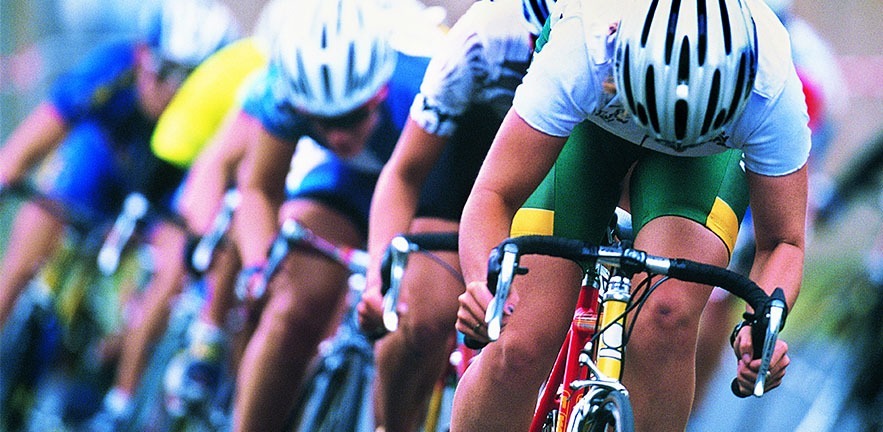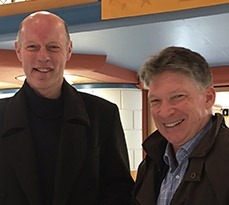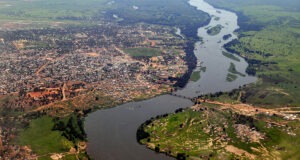Cambridge Judge Business School alumni Steve Edwards and Tom Ujejski were part of the very first Executive MBA (EMBA) cohort in 2009. The Scottish geologist and the Canadian lawyer soon found themselves working on a plan to shake up the energy sector.

“I thought to myself if I can do that, I can at least get an oil company off the ground.”
The “that” that Cambridge Judge alumnus, Steve Edwards is referring to is his second year Executive MBA project – namely dreaming up and delivering the UK’s largest ever mass cycling event, RideLondon, now in its sixth successful year. Along with fellow classmates Stuart Blackley and Ed Brand, Steve got everyone, including the Mayor of London, Olympic medallists and the Metropolitan Police sitting down in a room and agreeing that closing down the capital for tens of thousands of freewheeling families, whilst also hosting a 100 mile challenge race for dedicated cyclists was a great idea.
Steve, a keen cyclist well before he arrived in Cambridge, knew that who – or what – is behind you is everything. With a tailwind, the journey is quicker, smoother and much more fun.
Fast forward ten years and the oil company is off the ground too, co-founded with EMBA classmate, Tom Ujejski.

Both men had a hunch that there was a different way of “doing” oil and gas. Traditionally a high-risk enterprise it gets even riskier for a junior oil company looking to enter the game. But what if they managed to de-risk the whole business? Take over existing but under-exploited oil fields, challenge the traditional transactional models by hedging the oil price, and re-write the insurance model to cover any interruptions to production?
“When you lay it out like that it’s quite straightforward,” says Steve, “but the thing is, it’s hardly ever thought of like that. It’s never been heard of because no one has ever asked the question.”
Before fully committing to incorporating a company, Steve kept working full time at the Chinese oil and gas firm CNOOC whilst contributing ideas and contacts. At the same time, Tom got started on the corporate, commercial and legal framework of the fledgling enterprise.
Steve explains “We were targeting the simple but forgotten assets – the fields that were producing oil already but they weren’t optimised, they weren’t shiny, they had slipped down the portfolios of the big companies, so we took full advantage of their lack of focus. We knew they were very solid investments that just needed a bit more care and investment to increase production.”
Tom smiles, “It’s all about marginal gains, looking all the way along the value chain, and the potential is there to make a difference.”
Eventually, they got in the room with Shell and Esso who agreed to sell them four of their fields in the North Sea. Seven years after leaving Cambridge Judge, Steve and Tom secured their first deal. However, until that point they are both at pains to underline that although they never doubted their model “we were a startup with no assets”, battling against a fierce headwind of incredulity, opposition and closed doors. “There were some difficult, dark days,” admits Steve.
But their business school training stood them in good stead, giving them the confidence, as Tom puts it, “to tackle things we had no idea we could tackle”. Both had been drawn to the brand-new Cambridge Executive MBA programme that year by the broad and imaginative syllabus on offer, matched by an open-minded and global cohort of fellow students in whose eyes lit up at the “what if” style of thinking promoted by the School.
Meeting that very first EMBA class of just 46 students in 2009, Steve was struck by the sense that, compared to other business schools he had researched, “there was very little grandstanding” despite the highly impressive backstories that each classmate brought to the room. He also knew exactly why he was there:
“I was on the look-out for fellow entrepreneurial types and asking myself, what language can I learn here to enable me to take that next step?”
Tom now sits on the School’s Advisory Board and chairs the Alumni Council and agrees that the Executive MBA was a game-changer for him too, “I had a lot of business experience scattered all over the place and what Cambridge Judge did for me was join all the dots and brought it into a clear, structured picture.”
That picture was, of course, Tailwind Energy. Since formal inception in 2016, Tailwind now owns and operates in UK offshore waters, produces 20,000 barrels per day and employs 50 people. The plan is to continue to grow the company along the same lines – a combination of creative opportunity-spotting and prudent management.
The firm’s most recent acquisition is the Conwy oilfield in the East Irish Sea, which it will own and operate 100 per cent and has around 11 million barrels of reserves.
As the traditional Irish blessing goes, “May the wind be always at your back” … for the next ten years and beyond.

